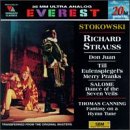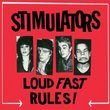| All Artists: R. Strauss, Stokowski, Houston Symphony Title: Strauss: Don Juan; Till Eulenspiegels lustige Streiche/Till Eulenspiegel's Merry Pranks; Salome: Dance of the Seven Veils; Canning: Fantasy on a Hymn Tune Members Wishing: 1 Total Copies: 0 Label: Everest Records Release Date: 1/25/1995 Genre: Classical Styles: Forms & Genres, Fantasies, Theatrical, Incidental & Program Music, Historical Periods, Modern, 20th, & 21st Century Number of Discs: 1 SwapaCD Credits: 1 UPC: 723918900421 |
Search - R. Strauss, Stokowski, Houston Symphony :: Strauss: Don Juan; Till Eulenspiegels lustige Streiche/Till Eulenspiegel's Merry Pranks; Salome: Dance of the Seven Veils; Canning: Fantasy on a Hymn Tune
CD DetailsSimilar CDs |
CD ReviewsA disappointment Larry VanDeSande | Mason, Michigan United States | 05/19/2007 (3 out of 5 stars) "This is an oddity -- Amazon recommended this CD to me even though it is no longer widely available in USA and even though Amazon itself does not sell it. This was one of Stokowski's Everest stereo recordings, formerly avialable in USA (not available now but still available in England so they'll be back). Stoki had a number of famous recordings on the Everest label -- Shostakovich Symphony No. 5 and Tchaikovsky "Francesca da Rimini" with the so-called Stadium Symphony Orchestra New York (it was the New York Philharmonic, I've read), and Wagner bleeding chunks including Stoki's own "Parsifal Act III Synthesis" with the Houston Symphony Orchestra. Many of these fine recordings have been reinvented by Arkiv Music, which bought the American rights and is reburning them from the original material. This recording, which sounds pretty good for 1959 even though a bit of wow is apparent every now and again, lacks Stokowski's resident charm, wit, risk-taking and charisma. You'd think Stoki would register a magnificent "Til Eulenspiegel's Merry Pranks", since both are mischievous sorts that like the occasional prank. Alas, that's not what Everest caught in this recording. Instead, the readings of Strauss's "Don Juan" and "Til Eulenspiegel" are so generic it could be any of 100 conductors leading the New York Phil. And Stokowski moves so rapidly through "Don Juan" you think he either trying to out-Szell George Szell, he dislikes the music, or he was tired of spending time in the recording studio and sought to get it over with as quickly as possible. With sound that shows its age and scores of magnificent Strauss available at similar cost by Karajan, Bohm and others, this one isn't anything special. The CD includes American Thomas Canning's (1911-89) "Fantasy on a Hymn Tune by Justin Morgan" performed by the Houston Symphony. It is 11 minutes of neoclassicism that was recorded once before by Raymond Leppard and the Indianapolis Symphony. Canning also wrote a double quartet and some songs, any of which may be as memorable as the fantasy." One of Stokowski's rare forays into Strauss - therefore impo Discophage | France | 07/26/2008 (4 out of 5 stars) "Other than "Death and Transfiguration", I'm not particularly fond of Strauss' symphonic poems, and consequently have never done any serious listening of them (meaning, thorough comparative listening, score in hand). Therefore I won't risk any opinion on Stokowski's interpretation, other than saying, tentatively, that having indeed listened to his Don Juan and Till with score, I found his readings proficient enough and invigoratingly boisterous, even intensely passionate in Don Juan, true to score and free of the kind of tampering or fiddling around with tempos that is often associated with him (and in my Stokowski experience, unjustly). As for the sonics of this 1959 recording, I find them excellent, if not as stupendous as some other of these Everest reissues. But obviously, these reissues are aimed not at the "simple" music lover just looking for a good recording of Strauss' tone poems - that person should be redirected to just about any recent CD - but to the historically-minded record buyer and Stokowski fan. For these, let me provide some basic info on these recordings and their significance. I don't know what the situation was with his concert programs, but, surprisingly (considering the kind of orchestral showpieces those works also are), Stokowksi recorded very little Strauss in the studio: "Death & Transfiguration", yes, twice - but even there, fairly early in his career: 1934 with Philadelphia (you can find it on RCA's valuable Legendary Strauss Recordings), 1941 with the All-American Youth Orchestra (reissued by Music & Arts, Stokowski Edition: Brahms, Bach, Mendelsson, Strauss or Brahms: Symphony No. 4; R. Strauss: Tod und Verklärung) and there was also a live version from 1944 that was published on 78rmp and LP, made with the New York City Symphony Orchestra - not an alias for the New York Phil, but an orchestra Stokowski founded (reissued by Cala, Piotr Ilich Tchaikovsky: Symphony No.6 / Richard Strauss: Tod und Verklärung). And Salome's Dance, three times (there are also a couple of live recordings): 1921 Philadelphia (not yet reissued apparently), 1929 and Philadelphia again (also reissued by Music & Arts, in a 4 CD-set containing CD Premières of Their Rarest 78 RPM Recordings, 1927-1940 - "their" refers to Stokowski and Philadelphia) and this one. But these are his only recordings of Don Juan and Till, and other than the more than minor Gavotte from the Suite for Wind Instruments op. 4 (and a live recording of Metamorphoses), this is it for Stokowski as far as Strauss is concerned. So this is an important disc for the Stokowksi admirer, and in view of the very few forays he apparently did in the music of that composer, I am even more admirative of his proficiency with the scores. The CD is also valuable for its rarity item, Thomas Canning's - and I'll give the complete title, here: "Fantasy on a Hymn Tune by Justin Morgan for Double String Quartet and String Orchestra", recorded in 1960 (I confess that I did not know there had been another recording). As everybody no doubt will know, Canning was born in Pennsylvania in 1911 and trained at the Oberlin Conservatory and the Eastman School of Music, where he later taught theory and composition. The Fantasy as written in 1944, and premiered two years later by Howard Hanson at Eastman. And as everybody no doubt will know (no, you are not trapped in a time circle!), Justin Morgan (the author of the hymn tune) was an 18th-Century American composer from New England, who specialized in writing, well, hymn tunes. I certainly wouldn't describe Canning's composition as "neo-classical": I hear no Bach lurking beneath the surface. It recalls Cowell's Hymn and Fuguing Tunes, and even more (as the liner notes appropriately point out) the works for strings of Vaughan Williams. It may not quite be in the league of the Tallis Fantasia, but no one would raise an eyebrow if it had been signed by the British composer. Ah, unjust fate. With the name Vaughan Williams tagged on it, the Justin Morgan Fantasy would have been a mainstay of the repertoire for string orchestra. By Thomas Canning, it is a mere curio. TT is a shortish 51', but notwithstanding no serious Stokowski admirer and collector will want to be without this disc." Strauss in a mood of high exuberane Santa Fe Listener | Santa Fe, NM USA | 07/21/2007 (5 out of 5 stars) "I think that this CD is much better than Mr. VanDeSande gives it credit for, even though I generally agree with him. The sonics are a bit glaring and thin, no longer qualifying as the sonic spectacular they were fifty years ago. But Stokowski isn't generic in his conducting by any means. His "Don Juan" has more swagger and genuine spontaneity than I've heard from almost any other conductor. He eschews the Wagnerian gestures that one finds in a great Straussian like Karajan. The inner life displayed in this reading is very appealing.
Till Eulenspiegel is wonderfully tambunctious and sparkling, although his mnischief is jolly compared to more pernicious readings that bring out sharper edges in Strauss's satirical clarinet writing. Stoki moves things right along without much of his characteristic rubato and shape-shifting of the phrase. You'd expect the lurid Dance of the Seven Veils to be meat for him, but in fact Stokowski doesn't linger over the erotic touches in the score and in general seems a bit over hasty. That small quibble aside, the only thing amiss about this exuberant CD is the stingy timing." |


 Track Listings (4) - Disc #1
Track Listings (4) - Disc #1
